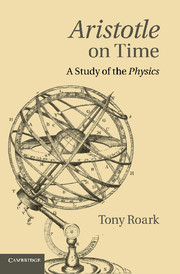Book contents
- Frontmatter
- Contents
- Preface
- List of figures
- List of abbreviations
- Introduction
- PART I TIMES NEW AND OLD
- 1 McTaggart's systems
- 2 Countenancing the doxai
- PART II THE MATTER OF TIME: MOTION
- PART III THE FORM OF TIME: PERCEPTION
- PART IV SIMULTANEITY AND TEMPORAL PASSAGE
- References
- Index locorum
- General index
1 - McTaggart's systems
Published online by Cambridge University Press: 03 May 2011
- Frontmatter
- Contents
- Preface
- List of figures
- List of abbreviations
- Introduction
- PART I TIMES NEW AND OLD
- 1 McTaggart's systems
- 2 Countenancing the doxai
- PART II THE MATTER OF TIME: MOTION
- PART III THE FORM OF TIME: PERCEPTION
- PART IV SIMULTANEITY AND TEMPORAL PASSAGE
- References
- Index locorum
- General index
Summary
One needn't be a metaphysician to have been gripped by puzzles concerning the nature of time. Does it have a beginning? Will it ever come to an end? Why is it that we can remember the past but can only anticipate the future? What happens to objects and events of the past – do they exist in any sense at all? Are any events of the future already determined? Am I identical to any person who existed in the past? How is it that time passes? What is time, anyway? Growing up on our family farm, I would sometimes lie awake nights pondering questions such as these, unsure how I might even begin to find their answers.
As C. D. Broad's remark quoted in the Introduction suggests, much of the difficulty we experience in discussing and contemplating time arises from the language in which we frame the propositions of speech and thought. Certain facts about the English language (e.g. that temporal adverbs are frequently vague or are used ambiguously, that verbs tokened in writing and speech indicate grammatical tense, or even that the word “time” can function as the subject of a sentence) give rise to challenges for those who would inquire into the nature of time.
But these are no less facts about Attic Greek than they are about English, and Aristotle – arguably the first philosopher to explicitly attempt to unravel the snares inherent in language – must have faced the same sort of challenges that arise from them when he composed his own theory of time, an account that he develops in chapters 10–14 of Book iv of the Physics.
Information
- Type
- Chapter
- Information
- Aristotle on TimeA Study of the Physics, pp. 11 - 16Publisher: Cambridge University PressPrint publication year: 2011
